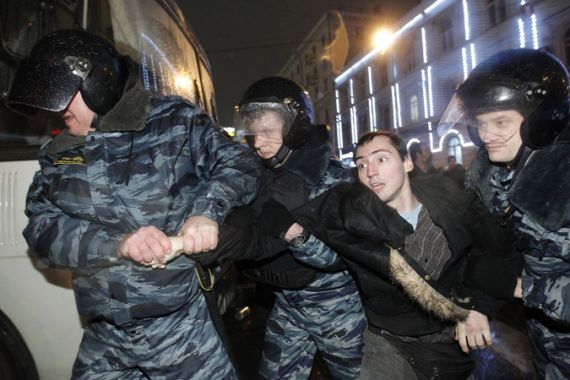Arrests in Russia after anti-Putin rally
Activists detained after protests over results of criticised election which kept Putin’s United Russia in power.

Hundreds of Russian opposition supporters are being held by police following protests in the country’s two largest cities against the results of Sunday’s parliamentary elections.
Police said they had detained more than 300 people in St Petersburg and Moscow as protesters attempted to stage mass demonstrations for a second day on Tuesday.
Several thousand people first took to the streets of central Moscow late on Monday to protest against alleged fraud and voting irregularities after Vladimir Putin’s United Russia retained power, albeit with a greatly reduced share of the vote.
Among those detained was Russian opposition leader Boris Nemtsov who was stopped as he tried to join protesters defying a ban against rallying in Moscow.
Police said they had also arrested Ilya Yashin, a prominent activist, and Alexei Navalny, an opposition blogger, after the protesters marched towards Lubyanka Square where the headquarters of Russia’s FSB security service is located.
| ELECTION COVERAGE | |||||||||
|
Navalny has won a huge online following for exposing corruption at state-owned firms and he coined a phrase – “Swindlers and thieves” – which has now been taken up by all the opposition.
During the rally, organised mostly through online social networks, protesters chanted “Russia without Putin” and “Putin should be in prison.”
Al Jazeera’s Neave Barker, reporting from the rally, said police locked down the centre of the city after several hours of violent clashes between anti-government protesters and riot police backed by interior ministry forces.
He said protesters had gathered to listen to opposition leaders but many demonstrators ended up clashing with police who had hemmed in rally participants.
Meanwhile, officials said that interior ministry troops were sent to Moscow and the alert level of security forces was increased after the protest.
“They (the troops) have just one aim – to ensure the security of the citizens,” interior ministry forces spokesman Colonel Vasily Panchenkov told the Interfax news agency.
“The number of troops deployed is determined by the Moscow police,” Panchenkov added, without giving numbers.
Ballot box setback
Putin said on Tuesday that the government needed changes after a March 4 presidential election.
“There will of course be a significant renewal of personnel in the government,” Putin told members of his ruling United Russia party.
After the biggest electoral upset of his 12-year rule, Putin said he would adjust to society’s demands for modernisation.
United Russia obtained 238 seats in the 450-seat Duma, down sharply from the 315 seats it won in the last polls in 2007.
Its biggest opposition will be the Communist Party with 92 seats. It was followed by the A Just Russia party with 64 seats and the ultra-nationalist Liberal Democratic Party with 56 mandates. Turnout was just over 60 per cent.
The United Russia only managed to win 49.35 per cent of the vote, down sharply from over 64 per cent in 2007.
The opposition claimed the results would have been even more dramatic in clean elections.
‘Procedural violations’
Monitors led by the Organisation for Security and Co-operation in Europe (OSCE) said the polls were slanted in favour of United Russia and marred by “frequent procedural violations” including ballot stuffing.
US Secretary of State Hillary Clinton also raised “serious concerns” in an address to OSCE officials in Lithuania.
“When authorities fail to prosecute those who attack people for exercising their rights or exposing abuses, they subvert justice and undermine the people’s confidence in their governments,” said Clinton.
“As we have seen in many places, and most recently in the Duma elections in Russia, elections that are neither free nor fair have the same effect.”
According to police, 2,000 people showed up at the Moscow rally while Shorina said up to 10,000 attended the rally and 1,500-2,000 marched later towards the offices of the Central Election Commission.
It was the largest protest in many years and a boost for Russia’s embattled opposition which traditionally struggles to mobilise protesters in a country which lost its taste for street politics in the turbulent 90s.
